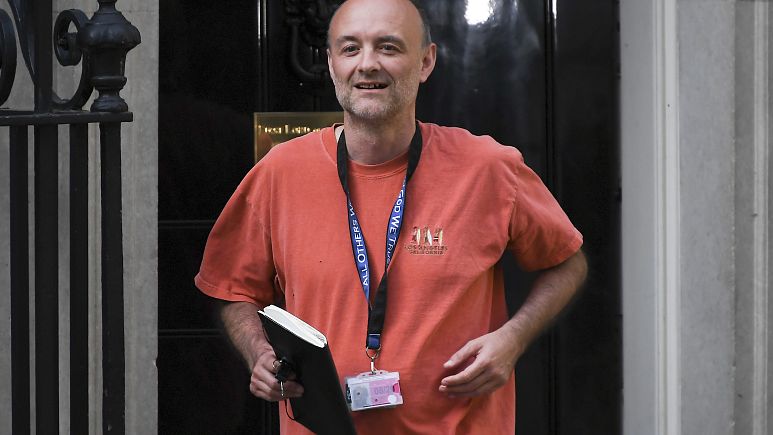Who is Dominic Cummings and why do so many people want him sacked?
by Alice Tideyeuronews_icons_loading

Dominic Cummings, a figure who is both revered and loathed in the UK for his role in the Brexit referendum, is now at the centre of a political scandal over whether he flouted lockdown rules.
British Prime Minister Boris Johnson has refused to sack Cummings, a key advisor and ally, after it was revealed that he and his wife travelled 400 km from London to his native Durham, in northeast England, in late March despite both having COVID-19 symptoms.
Johnson stuck by his aide on Sunday, arguing that Cummings, 48, had "no alternative" and had "acted responsibly and legally". This triggered consternation in the ranks of the opposition and Conservative MPs alike, as well as online where #Cummings was trending on Monday morning.
Later on Monday Dominic Cummings appeared before reporters to defend his trip, insisting he had behaved "reasonably and legally".
- Coronavirus: Spaniards take to the terraces as lockdown eases
- Watch: Boris Johnson says aide 'acted responsibly' in row over lockdown
Cummings' rise to Downing Street
Cummings's influence over Johnson, his attacks on the civil service and the media, and his tactics during the 2016 referendum, have made him one of the UK's most controversial political figures.
Born in 1971 to an oil rig project manager and a special needs teacher in Durham, Cummings was educated at Oxford University where he read Ancient and Modern History.
After a three-year stint in Russia - during which he worked on the launch of a failed airline - he returned home and made his first foray into the world of politics.
A renowned Eurosceptic, he was hired as campaign director by the Business for Sterling lobby group which opposed the UK's adoption of the euro currency.
He also started advising grandees of the Conservative party, beginning in 1999 with then shadow secretary of state Ian Duncan Smith.
Four years later, he described the then leader of the Conservatives as "incompetent" in a scathing Telegraph op-ed calling for his removal.
He got his first taste of referendum campaigning in 2004 when he opposed the creation of an elected regional assembly in his native northeast. To get its point across, the "North East Says No" campaign travelled around with an inflatable white elephant.
From 2007, he advised Michael Gove who, in 2010 became Education Minister when the Conservatives got into power. He continued to advise him through to 2014, making himself few friends in the civil service and teachers' unions.
But it is his role from 2015 onwards as the mastermind of the Vote Leave campaign that turned him into a household name.
Cummings is credited with penning the "Take Back Control" slogan and for coming up with the controversial bus stunt that claimed that leaving the EU would result in an extra £350 million a week being invested in the National Health Service.
The campaign was even the subject of a television series, "Brexit: The Uncivil War", in which Cummings was portrayed by Benedict Cumberbatch.
Vote Leave, which won the referendum, was found to have breached electoral law over spending limits in 2018 with the Electoral Commission issuing a £61,000 (€68,300) fine.
He was also found in contempt of Parliament for refusing to appear in front of a committee investigating "fake news".
Since Johnson has been in Downing Street, Cummings grabbed headline for posting a job advert on his personal blog calling for "weirdos and misfits with off skills" to join the government.
'One rule for Dominic Cummings'
The leader of the main opposition labour party, Keir Starmer, said that by refusing to sack Cummings, Johnson "has treated the British people with contempt".
"One rule for Dominic Cummings, another for everybody else," he added.
Scottish First Minister Nicola Sturgeon said that although "it is tough to lose a trusted adviser at the height of crisis", the "integrity of vital public health advice" should come first.
"That's a judgment I and, to her credit, Catherine Calderwood reached. The PM and Cummings should do likewise," she added.
Calderwood resigned for her position as Scotland's chief medical officer last month after she and her family visited their second home on consecutive weekends despite confinement measures calling for people to stay at home.
They are backed by a majority of the public, according to a poll by YouGov. Of the 3,700 respondents taking part, 52% said Cummings should resign while 28% said he should not.